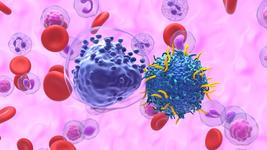Clinical Trial Update – CRISPR-Engineered Dual Specificity CAR-T Therapy
CMN Intelligence - The World’s Most Comprehensive Intelligence Platform for CRISPR-Genomic Medicine and Gene-Editing Clinical Development
Providing market intelligence, data infrastructure, analytics, and reporting services for the global gene-editing sector. Read more...
A phase I/II trial, which is sponsored by the Chinese PLA General Hospital, aims to assess the feasibility and safety of a CRISPR-Cas9-engineered dual CAR-T therapy with specificity for CD19 and either CD20 or CD22.
The Challenge with CD19-targeting CAR-T Immunotherapy
CD19 is a cell surface antigen expressed by all B-cell cancers, a feature that has made it a highly attractive target for cancer immunotherapy. The first two CAR-T therapies to be approved in 2017 target CD19 and many more are in development for relapsed or refractory B-cell cancers such as leukaemia and lymphoma.
However, despite the initial excellent clinical response seen with CD19-targeting CAR-T therapies, relapse in a subset of patients has emerged as a serious challenge for long-term disease control. This relapse happens because of antigen escape, a naturally occurring event whereby tumour cells lose or down regulate the CD19 antigen.
Exactly why antigen escape happens in some patients and not others is unknown, but the prognosis for relapsed patients is poor, and dual-targeting of CD19 along with other B-cell surface markers has been proposed as a potential solution.
Dual Specificity CAR-T Immunotherapy
CD20 is a B-cell surface marker that is involved in the development and differentiation of B cells into plasma cells. It is expressed during most stages of normal B cell development but down regulated in terminally differentiated plasma cells. The uniform and stable cell surface expression of CD20 on many B cell cancer types made it an attractive target for immunotherapy even before the advent of CAR-T, with a number of approved CD20-targeting therapeutic monoclonal antibodies for cancer treatment, e.g., Rituximab, Obinutuzumab, Ofatumumab.
CD22 is primarily expressed on the surfaces of mature healthy B cells and it is also expressed by most leukaemic cells in the majority of B-cell acute lymphoblastic leukaemias. Both CD20 and CD22 have emerged as attractive targets either alone or in combination with CD19 for dual specificity CAR-T therapies to treat certain relapsed or refractory B cell cancers with a number of trials underway, particularly for the treatment of multiple myeloma and acute myeloid leukaemia.
Chinese PLA Hospital Trial
The trial discussed here is open-label and non-randomised, and aims to enroll up to 80 participants between 12 and 70 years of age, with relapsed or refractory leukaemia and lymphoma.
Patients with will be treated intravenously with donor-derived CRISPR-Cas9 engineered dual CD19 and CD22 or CD19 and CD20 CAR-T cells over a period of 20-30 minutes. A dose-ascending strategy will be used, beginning with 10 % of the total anticipated dose on Day 0, rising to 30 % on Day 1 and 60 % on Day 2 if no significant toxicity is observed following the prior dose in each case.
The primary study outcomes include determination of the maximum tolerated dose, monitoring for severe adverse events, and evaluation of in vivo persistence of the CAR-T cells over time in peripheral blood, bone marrow and lymph nodes via real-time PCR and flow cytometry.
The study’s secondary goals include measuring the 6-month anti-tumour responses following dual specificity CAR-T cell infusions in patients with detectable disease as well as survival 6 months post-treatment.
The expected primary completion date is May 2022.
For a complete overview of current gene editing clinical trials, check out CRISPR Medicine News' Clinical Trials Database.
Tags
Articlein vivoB-cell Malignancy, NHLCancerCAR-TCas9Chinese PLA General HospitalTrialsClinical
CLINICAL TRIALS
Sponsors:
Base Therapeutics (Shanghai) Co., Ltd.
Sponsors:
Base Therapeutics (Shanghai) Co., Ltd.







